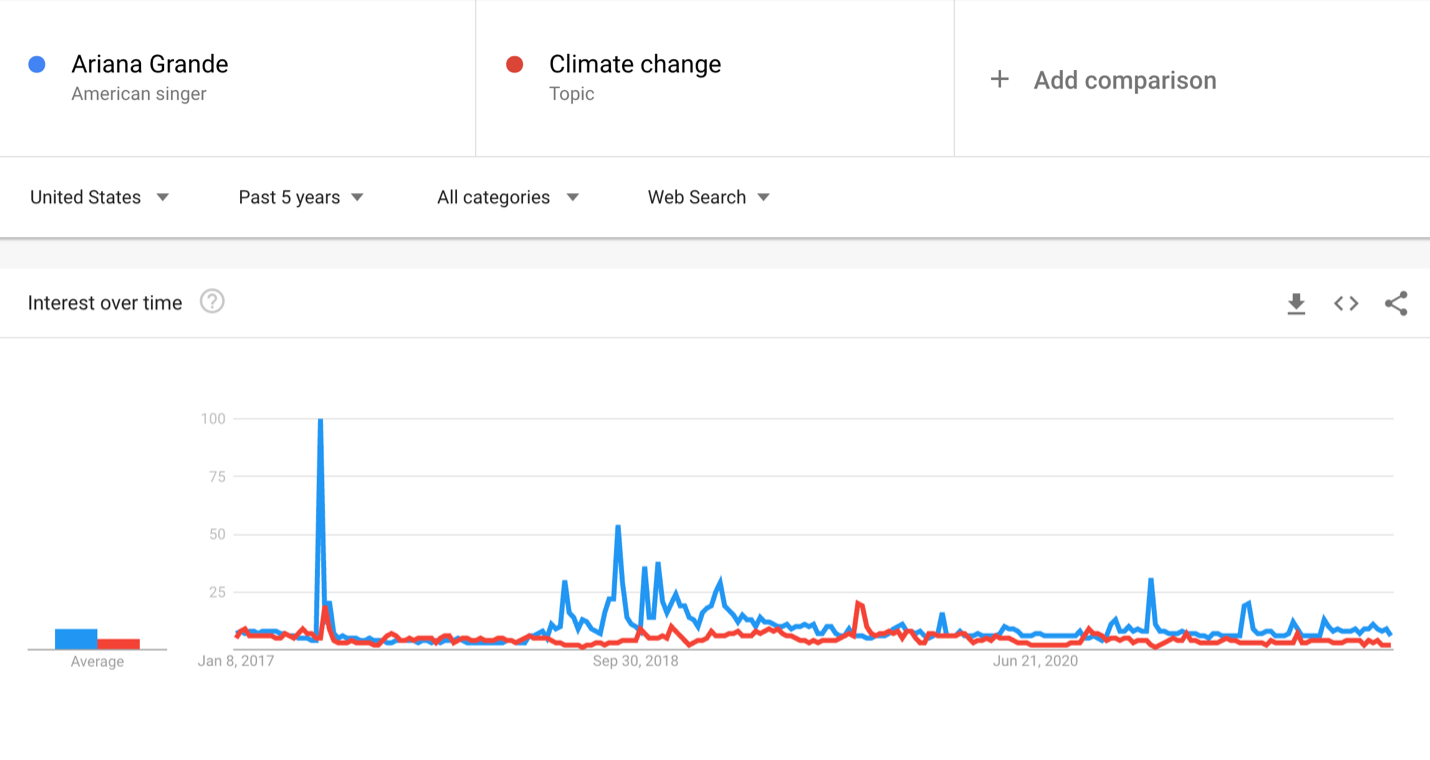Disclaimer: this blog contains spoilers for the movie Don’t Look Up.
First of all, I do recommend the movie Don’t Look Up. It starts off so good! It gives an accurate depiction of grad school with some tea, a cold sandwich at the desk, headphones, routine data analysis, some fun science, good background music, and excitement about discovering something new—in this case, a comet. “This is going to be a fun movie,” I thought. When I saw the credits, and Ariana Grande’s name, I thought again, “Yep, this is good.”
My colleague, Erika Spanger-Siegfried agrees, you can read her blog post about the movie here.
Then, the scientists’ excitement dissipates with the realization that the new comet is heading towards Earth and will be catastrophic. A mass extinction event. Excitement turns into fear. The characters think and do what science does: confirm results, confirm again…one more time. Once they’re sure that this is extremely bad, they need to tell someone who can do something about it. Surely everyone will listen, right?
Then the movie hits me. The analogies with our current climate crisis begin. Just like in the movie, we downplay risks, to our own downfall.
Close to home
This satire hit too close to home. Frustration, anger, fear, sadness, and—at the very end—hope were some of the feelings I experienced watching it. There were also smiles, and some nervous laughs here and there (especially when they mentioned media training for scientists), and when the dramatization of events looked very much like what has been happening with climate change science for the last decade(s).
Denial starts even with the most straightforward facts. The comet has a 100 percent (99.78 percent to be exact) chance of hitting the Earth in the movie. Yet, in the movie, those downplaying it want to call it only a “potentially significant event.” This is surprisingly similar to the discussion surrounding climate change.
Unlike a hypothetical catastrophic comet, you may think climate change can be averted through individual actions, and you are right, for the most part. We need individual action in the form of pressure, advocacy, and fighting (and educating) those who don’t want us to “look up.” However, the climate crisis is bigger than any individual, and we need those in power to do something about it. We already know what needs to be done.
Another similarity between the movie and the climate crisis is when Dr. Mindy (played by Leonardo DiCaprio) asked himself and his team, “Why aren’t people terrified? What do we have to say? What do we have to do?” I felt that deeply, because I honestly don’t know the answers to those questions in the context of climate change.
I suppose we focus on more comfortable topics. Some choose to ignore the severity of climate change as an immediate defense mechanism. Others are just greedy; such as some of those who benefit from denying the climate crisis. And all of us are often caught in the crossfire of all the things targeting our attention.
For example, I grew curious about how public interest in Ariana Grande compared with public interest in climate change. In the United States, for the past five years, public interest in climate change has lagged compared with interest in Ariana Grande (Figure 1) and many other celebrities. Don’t get me wrong: she is excellent, and I enjoy her music and her song in the movie. Like the film, I’m just questioning our societal priorities. So please read about climate change while listening to the song, and remember to “just look up.”

Can you imagine the comet devastating the Earth and still having politicians on one side saying it is not happening or that it is not as bad? Unfortunately, I can. One of the ironies is that climate change is already here, and some people in power still deny it and downplay it, delaying action. The part of the movie that stuck with me the most is the scene where Dr. Mindy lashes out about the way we can’t even agree at the most basic level of understanding. If a comet (climate change) is heading towards the planet (it is already here), that is bad, period. Extremely bad.
How climate change affects me
Moving away from the movie, I want to reflect on the ways climate change affects me. I believe sharing emotions in science is essential for conveying what we as scientists spend years studying, so I’ll open up a bit.
My job is to research climate change and study its relationship with water, and I mainly focus on how climate change affects vulnerable communities. I’m tearing up because even as I’m writing, I’m tired. I’m tired of the constant feeling of working hard, without seeing enough impact from my work. I’m frustrated by seeing the work and research of colleagues and other climate scientists diminished, dismissed, or attacked by trolls, corporations, and politicians. Most of us are only trying to create a better place for everyone—even for them.
Some days I wake up incredibly hopeful and motivated, thinking I can help make this a better world; other days, I feel that it is impossible, and I think that I’m not doing enough, or that the things I’m doing are not practical.
At this stage, climate change is affecting my emotions, my sleep, and with that, my energy. It affects my sleep not by preventing me from falling asleep (I’m often too tired at the end of the day for that), but when I wake up and feel the anxiety of having one less day to solve this crisis. I’m an optimist, so the way I force myself to get up with a smile (ask my friends, I’m often smiling) is by shifting my mindset to make me believe that, instead, I have another day to keep trying.
Climate change is also impacting me through new thoughts about daily decisions that in many cases are good and necessary: “should I buy that?” “I should not take a flight,” “no, that would be a waste of water,” “yeah, this is more expensive but seems more environmentally friendly.”
Another way in which climate change increases my distress is that I spend my days doing research about the drought, wildfires, extreme heat, species going extinct, and ecosystems collapsing—all while the fossil fuel industry, the animal agriculture industry, and other big corporations spend their days working to downplay the facts and to block change.
Physically, living in California’s Central Valley, higher temperatures reduce the number of days when it is feasible to perform certain outdoor activities. Smoke from wildfires damages my lungs, something that, by now, virtually every person in California experiences for at least a few days every year. There are economic impacts as well, for example, as the need for air conditioning increases.
Climate change is impacting me most through the many ways it is directly and physically affecting others.
Frontline vulnerable communities across the world are already being impacted by climate change. Impacts include, among many others, coastal flooding, killer heat, reduced water, decreased water quality supply, pests, the proliferation of diseases, and polluted air.
Where do I get hope?
From you. From the people interested enough to reach this far in my post. In this era of division, I invite you to advocate for unity, to be the better person, and show patience and love to people whose understanding of the world is different from ours. If you still don’t realize how climate change is affecting you now, but you recognize it may affect you in the future, advocate for your future by advocating for the present of others. Do the exercise of thinking about how climate change is affecting you. Write about it, share it. Help create a larger movement. Are you looking up?

